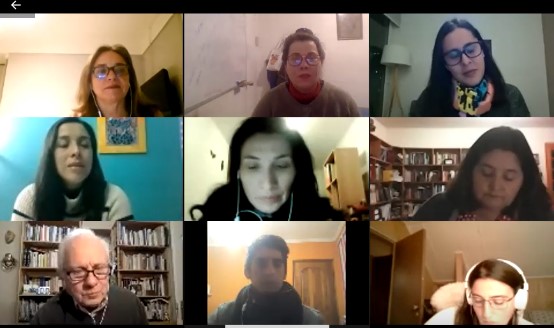University of Chile and IICA kick off Diploma in Rural Extension 2021

Santiago, 1 July 2021 (IICA). The Faculty of Agricultural Sciences of the University of Chile in collaboration with the Inter-American Institute for Cooperation on Agriculture (IICA) kicked off the fifth edition of the Latin American Diploma in Rural Extension. The program has an international focus and aims to deliver the theoretical foundation and practical tools for rural extension professionals.
Roberto Neira, Dean of Faculty, welcomed students to the first session of the course and explained that some time ago, they identified that agricultural extension had, in general, been neglected in terms of educating extension professionals.
“Today there are specific methodologies for its professionalization and these need to be learned from subject matter experts. In this fifth edition, we are convinced that we need to continue delivering a better quality of information and education on the subject of extension and we have the opportunity to learn from the experiences of other Latin American countries in a way that will enrich the program”, commented the dean.
With the collaboration of IICA, a high-level international panel was convened, which included the participation of Fernando Landini, an acclaimed professor from Argentina with a doctorate from the University of Buenos Aires and an international master’s degree in local rural development, who taught the first class, and other renowned academics, including Hur Ben Corrêa da Silva, a Brazilian professor from the Rural Development Institute of Paraná, IAPAR-EMATER; Fernando Manzo-Ramos, lead research professor with the Rural Development Studies Program at the College of Postgraduate Studies of Mexico (COLPOS); and from Costa Rica, Viviana Palmieri, Specialist in Technological Innovation Management at IICA, among others.
Hernán Chiriboga, IICA Representative in Chile, commented that “we believe that the combination of international cooperation and academia is an excellent opportunity to generate synergies and, on this occasion, we are in tune working for the agricultural sector in Chile and the Americas because we seek the same objectives as the prestigious University of Chile”.
Chiriboga congratulated the students for doing what is important instead of urgent, stating that taking a diploma program requires an additional effort and stepping out of their comfort zone.
Strong female component
Of a total of 14 students, nine are female. Claudia González, an agricultural engineer from the University of Chile, is one such student. “I decided to take the diploma program because of the journey I’ve been on for the past year of reconnecting with agronomy from the perspective of agroecology and with a focus on how farmers adopt these practices”, explained González.

“Within that framework, a desire was born to work with family farmer organizations and rural farmers themselves through Corporación Mundo Rural Pro, of which I am a part, and in collaboration with CONAGRO, seeking to apply the tools of rural extension—which I can learn from this program—in my outreach in the production world and farmer organizations to generate project proposals, training workshops, research, etc., based on knowledge recovery and teamwork”, she added.
Karina Orellana, Academic Coordinator, explained that the diploma program comprises three courses. The first is called Designing an Extension Program; the second Participatory Diagnosis; and the third Innovation Management and Communication.
“The courses are offered both simultaneously and separately, so that students can take any of them as a continuing education course and earn a specialization certificate, and still have time to register for the other courses”, stated Orellana.
IICA advisor Francisca Sepúlveda, executive coordinator of the diploma program and head of the learning platform, called on students to take part in this learning experience.
“The diploma is offered through distance learning (video conferencing), case study videos, online forums and complementary lectures. The video conferences include roundtables with international guests, all of whom are key actors in rural extension”, she commented.
To learn more about the diploma program, click on the following link:
https://www.diplomadoextensionrural.uchile.cl/
More information:
Institutional Communication Division.
comunicacion.institucional@iica.int